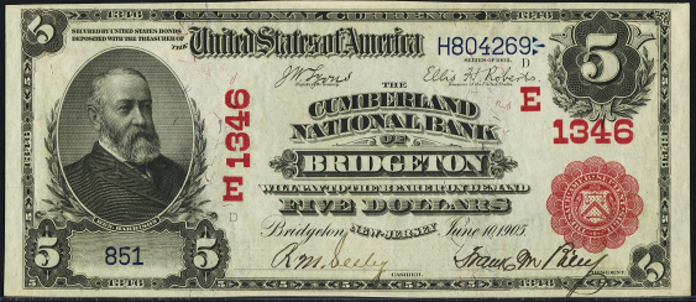Five Dollar Notes › Nationals › 1902 Five Dollar National Bank Notes › Colorado Charters › 1902 $5 Limon Colorado First National Bank
Get Value Now
| Item | Info |
|---|---|
| Series | 1902 |
| Charter | #11504 First National Bank of Limon, Colorado |
| Year Chartered | 1919, 288 Banks Chartered |
| City Info | The Town of Limon is the Statutory Town that is the most populous municipality in Lincoln County, Colorado, United States. Limon is located immediately east of Elbert County. The population was 1880 at the 2010 United States Census. Limon has been called the "Hub City" of Eastern Colorado because Interstate 70, U.S. Highways 24, 40, and 287, and State Highways 71 and 94 all pass through the town. The Limon Correctional Facility is part of the Colorado Department of Corrections system and is a major employer in the area with employment of roughly 350. Limon is listed as the official AASHTO control city for signs on Interstate 70 between Denver and Hays, Kansas, although westbound signs in both Colorado and Kansas often omit Limon and list the larger city of Denver. Source: Wikipedia |
| Similar Cities | If your note doesn't match try: 1. Limon, Colorado - Limon National Bank |
| Seal Varieties | Red, Blue |
| See Also | If your note doesn't match try: 1. 1907 $5 Legal Tender 2. 1899 $5 Silver Certificates |
| Other Info | 1. Value depends on notes known for charter, condition and market demand. |
| Neat Fact | Plain Backs issued in sheets of 4 $5 notes (Friedbergs, 20th Ed. P128) |
No Obligations Offers and Appraisals
Please submit a good photo or scan. It will be identified and evaluated. Understand there may be subtle differences between the image you see above and your note. Signatures, design, markings and note condition will determine the offer price. Notes in Uncirculated or better condition receive the best offers.
Appraisals can be estimated for wholesale and retail prices. Wholesale is what dealers typically pay. Retail is what a collector might pay. Retail is slightly higher in most cases.
Please visit this page for USA Paper Money Reference. Do not treat this page as a reference guide, it is for appraisal and acquisition purposes only.
